Material Disclosed To Income Tax Settlement Commission Needn't Be Something Which Wasn't Discovered By Assessing Officer : Supreme Court
Parina Katyal
26 Sept 2023 8:50 PM IST

The Court also explained that the scope of judicial interference with Settlement Board's decision is narrow.
Next Story


